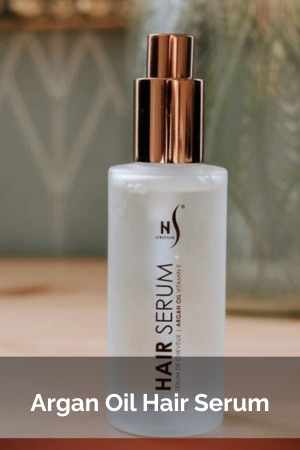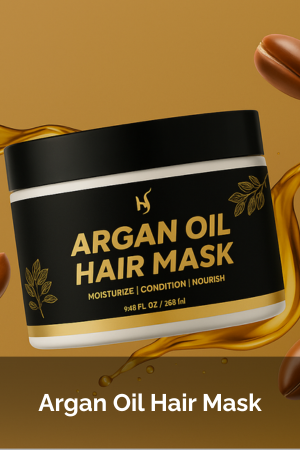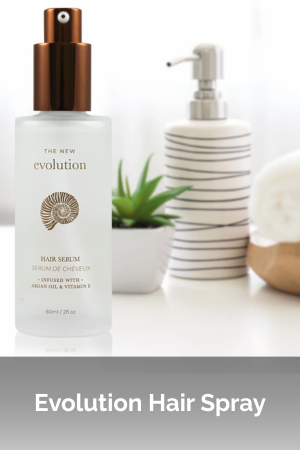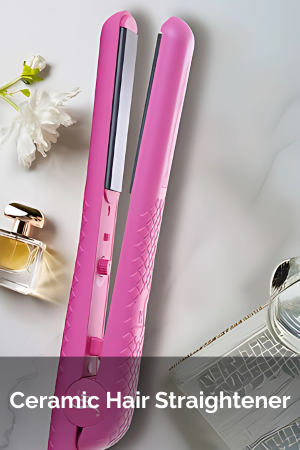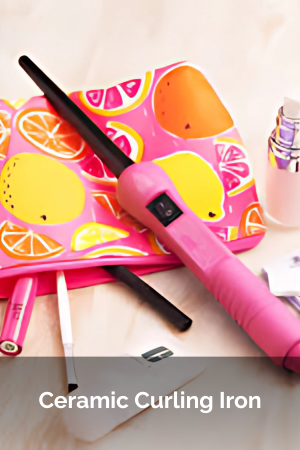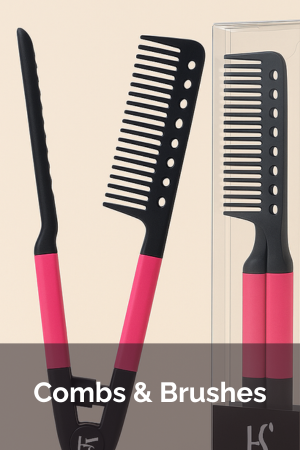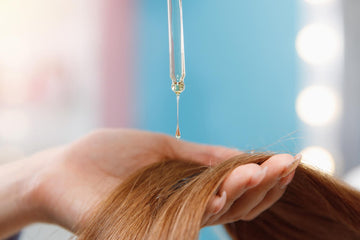Oils are currently everywhere in the hair care world, with everyone from professional stylists to beauty bloggers raving about how the right oil can really transform the look and feel of a dull and lackluster mane. There’s no denying the truth behind this claim – certain plant oils are brimming with hair-loving nutrients that are capable of giving your locks a sleeker, thicker, and healthier sheen.
At the same time, you don’t want to overload your strands with every oil out there, making it important for you to carefully select the right one. Two popular contenders are argan oil and coconut oil. Both are revered for their hair-boosting benefits but use them together and you’ll likely only end up with greasy locks.
So, which one do you pick? Read on as HerStyler talks you through the main differences between argan oil and coconut oil so that you can decipher which would be best for your hair.
Argan Oil vs. Coconut Oil: Where Do They Come From?
It’s always useful to understand more about where your chosen beauty ingredients come from.
In the case of coconut oil, it goes without saying that coconuts are the source, but do you know how the oil is actually harvested? It involves shredding the ‘meat’ from within the coconut before pressing it to extract the oil. Traditional methods involved the use of heat but cold-pressed coconut oils are now available too. These retain more nutrients than their heat-treated alternatives.
Meanwhile, argan oil is obtained from the kernels produced by the argan tree, which is native to Morocco. Extracting the kernels is quite a laborious process, after which cold-pressing takes place to harvest the oil.
Argan Oil vs. Coconut Oil: The Main Similarities and Differences
Now that you’re familiar with the background of each ingredient, let’s take a closer look at the various features that argan oil and coconut oil do and don’t have in common:
Nutrient Content
 One of the reasons why oils have become so popular in hair care is because of their nutritional profiles. Most plant oils are absolutely loaded with beneficial compounds, with coconut oil and argan oil being among the richest sources.
One of the reasons why oils have become so popular in hair care is because of their nutritional profiles. Most plant oils are absolutely loaded with beneficial compounds, with coconut oil and argan oil being among the richest sources.
Fatty acids are the first component to keep an eye out for. These have a moisturizing effect on the hair, leaving strands feeling softer and smoother. They’ll also give your hair a thicker and fuller finish. If this is a priority for you, argan oil comes out on top. Although coconut oil contains fatty acids too, argan oil boasts a much higher concentration.
When it comes to vitamin E, both oils are a great source. However, coconut oil also contains vitamin K, whereas argan oil boasts vitamin D. Both are beneficial, although many experts would say that vitamin D is the one that will have the biggest impact on your strands. This ingredient is directly involved in the functioning of hair follicles, which are responsible for growing your hair.
The best way to treat your strands to some of these key nutrients? With a hair serum. Unlike shampoos and conditioners, hair serums remain on the hair for a longer period. This gives all of those nutrients some extra time to soak into your strands. Find a hair serum that features argan oil or coconut oil, just like the HerStyler Argan Oil Hair Serum, and your hair should start looking better in no time!
Texture
 Of course, the texture of each oil is important too. Even though argan oil may win when it comes to hair-loving nutrients, there’s no point using it if it’s going to make your hair look limp and greasy.
Of course, the texture of each oil is important too. Even though argan oil may win when it comes to hair-loving nutrients, there’s no point using it if it’s going to make your hair look limp and greasy.
Fortunately, this isn’t something that you’ll have to worry about with argan oil. Out of the two oils, argan is lighter and thinner. It feels very different from coconut oil, which is much thicker and greasier. Just a quick glance at both oils will tell you the same, with argan oil remaining a liquid at room temperature while coconut oil solidifies.
What does this mean for your hair? Firstly, applying argan oil is much easier. It’s more spreadable, making it a breeze to evenly distribute it through your locks. Coconut oil, on the other hand, doesn’t spread with such ease. Try to rush through it and you could end up with greasy clumps in your hair. While this extra shine can be beneficial for those with dry strands, it can make fine hair look limp very quickly.
This is why argan oil was our oil of choice for the HerStyler VitaOil Biotin Hair Serum. This serum was designed to showcase the benefits of biotin, aka vitamin B7. This ingredient has been proven to leave the hair feeling thicker, particularly among those dealing with thinning hair. Combining biotin with an oil helps to optimize absorption, so we went with argan oil. This keeps the serum lightweight enough to be suitable for all hair/skin types.
Effects on Your Scalp/Skin
 Why does your skin matter when it comes to deciding which oil to use on your hair? Because your scalp is skin, your skin type needs to be considered when choosing products for your scalp.
Why does your skin matter when it comes to deciding which oil to use on your hair? Because your scalp is skin, your skin type needs to be considered when choosing products for your scalp.
Say, for example, your skin type is oily. This would mean that there’s a good chance you’ll have an oily scalp too. The last thing that you want to do is use a comedogenic oil on oily skin. This will only clog up your pores and hair follicles, leaving you dealing with inflammation, scalp acne, and yeast infections.
While coconut oil is comedogenic, indicating that it’s likely to clog pores, argan oil is non-comedogenic, meaning that it won’t. This makes argan oil a far better choice for oily skin.
Does this matter if you’re choosing oil-infused hair care products that aren’t going near your scalp, like a conditioner? Yes – even though you’ll only be applying your conditioner to the ends of your hair, your strands are still likely to swipe against the skin on your face/body while they’re soaked with conditioner. The run-off from a comedogenic oil when it’s being rinsed off is also still enough to cause breakouts on both the face and body.
When it comes down to it, if your skin is prone to acne, always go with hair care products that contain argan oil instead of coconut oil, just like the HerStyler Sleek Hair Conditioner.
Cost
 As we briefly mentioned earlier, extracting argan oil is a laborious process. It’s extensive, back-breaking work that requires 30kg of fruit and 15 hours of labor to produce just one liter of the oil. Let’s also not forget that argan trees can only grow in Morocco. This makes argan oil one of the rarest oils around.
As we briefly mentioned earlier, extracting argan oil is a laborious process. It’s extensive, back-breaking work that requires 30kg of fruit and 15 hours of labor to produce just one liter of the oil. Let’s also not forget that argan trees can only grow in Morocco. This makes argan oil one of the rarest oils around.
Meanwhile, coconuts, which can be found growing in many countries, are much easier to harvest than argan kernels. There are then a number of different tools and methods that can be used to extract the oil. This enables large producers to really keep their costs down.
As you can imagine, all of this is reflected in the price of each oil. Due to argan oil’s rarity, it’s one of the most expensive oils out there. Coconut oil, on the other hand, can be mass-produced, making it significantly cheaper.
The good news is that not all argan oil products cost the world. Rather than purchasing the pure oil, which can be pricey, go with a hair product that has been infused with a small quantity of argan oil, such as the HerStyler Argan Oil & Biotin Conditioner. It contains enough to give you all of the above-mentioned benefits that argan oil has to offer, yet without breaking the bank in the slightest.
How Do Other Oils Compare?
While argan oil and coconut oil are both great hair oils, there’s no reason to limit yourself to these two. There are plenty of other oils out there that can also bring about an improvement in the look and feel of your locks. Here are a few of our favorites:
Marula Oil
 Marula oil comes from the kernels of the marula tree, which grows in southern Africa. Like argan oil, marula oil is very lightweight, making it suitable for thin and fine hair. It’s not comedogenic either, so it won’t clog pores and cause acne.
Marula oil comes from the kernels of the marula tree, which grows in southern Africa. Like argan oil, marula oil is very lightweight, making it suitable for thin and fine hair. It’s not comedogenic either, so it won’t clog pores and cause acne.
Marula oil is particularly effective at making the hair look less frizzy. Smooth a marula oil hair serum, like the HerStyler Marula Hair Nourishing Serum, over your damp locks and you’ll be able to lock the moisture in, keeping the appearance of frizz at bay!
Jojoba Seed Oil
Jojoba seed oil is a popular skincare ingredient among those with oily skin. It very closely resembles the skin’s sebum, making it an ingredient that the skin readily accepts. Over time, the use of jojoba oil can make the skin feel less greasy, and it has this effect on the scalp too!
Add jojoba oil to your hair care routine and your locks will soon feel better balanced. Your hair will be hydrated without feeling greasy, making it much easier to manage.
Rosehip Oil
 Last but not least, let’s talk about rosehip oil. This is another ingredient that’s popular in the skincare world too due to its hydrating capabilities.
Last but not least, let’s talk about rosehip oil. This is another ingredient that’s popular in the skincare world too due to its hydrating capabilities.
With rosehip oil being mildly comedogenic, it could cause oily skin to break out. However, it’s not as pore-clogging as coconut oil. This could make it a good middle ground for those of you with dry hair and combination skin.
Give rosehip oil, as well as jojoba seed oil, a try with the HerStyler Rosehip & Sage Conditioner. This formula boasts sage oil too – another great plant oil to use on your mane!
Argan Oil vs. Coconut Oil: Which One Should You Go For?
Now that you know more about each ingredient, the decision between argan oil and coconut oil should, hopefully, be much easier. With argan oil being lightweight and non-comedogenic, it’s the only option for those of you with oily hair or skin. It’s a good option for dry hair too, thanks to the fact that it contains more fatty acids than coconut oil. In fact, argan oil comes out on top in just about every category, other than cost. However, with budget-friendly brands like HerStyler to turn to, you’ll be able to pamper your hair with high-quality ingredients without having to take out a loan!
Click here to shop for more bestselling hair care and styling products from HerStyler.


